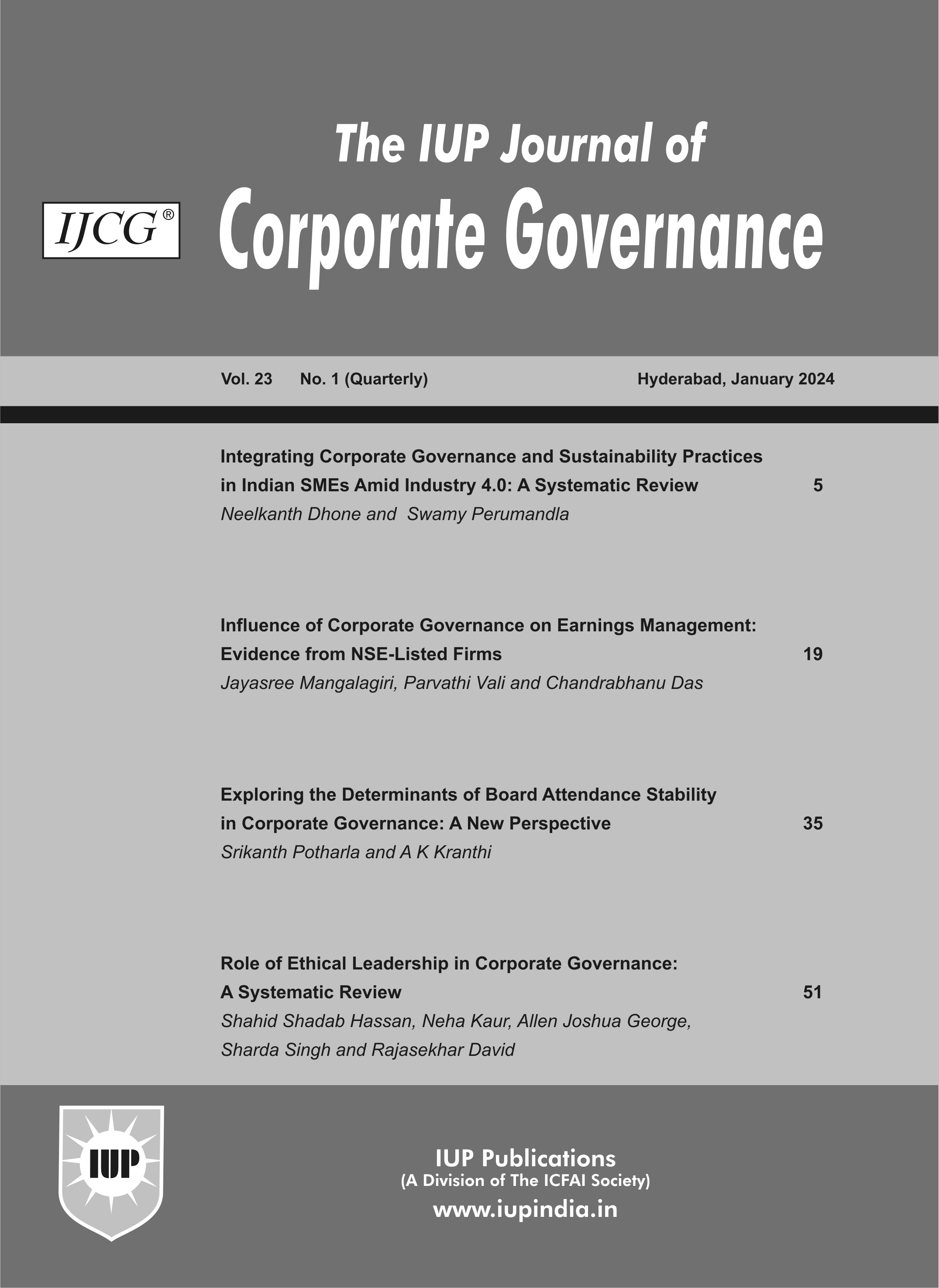
Jan'24
|
|
The IUP Journal of Corporate Governance
ISSN: 0972-6853
A "peer-reviewed" journal included in the ABDC List, and also distributed by EBSCO and ProQuest (Part of Clarivate) Database
The IUP Journal of Corporate Governance is a quarterly journal focusing on governance and ethics framework, role of boards, role of CEOs, CFOs and other senior management, role of other stakeholders, disclosure and transparency, regulation and best governance practices.
| Focus Areas | |
|---|---|
|
|
|
|
|
|
|||
| Article | Price (₹) | ||
| Integrating Corporate Governance and Sustainability Practices in Indian SMEs Amid Industry 4.0: A Systematic Review |
100
|
||
| Influence of Corporate Governance on Earnings Management: Evidence from NSE-Listed Firms |
100
|
||
| Exploring the Determinants of Board Attendance Stability in Corporate Governance: A New Perspective |
100
|
||
| Role of Ethical Leadership in Corporate Governance: A Systematic Review |
100
|
||
Integrating Corporate Governance and Sustainability Practices in Indian SMEs Amid Industry 4.0: A Systematic Review
The study examines the intricate relationship between corporate governance and sustainability practices in small and medium enterprises (SMEs) experiencing the disruptive impact of Industry 4.0. It explores the problems and opportunities associated with the convergence of SMEs in the digital era. Through a systematic literature review, it also focuses on developing customized governance frameworks that are well-suited to the distinct characteristics of these SMEs. The paper assesses techniques for effectively incorporating sustainability into the operational framework of SMEs during the implementation of Industry 4.0, focusing on the crucial role of leadership and organizational culture. Furthermore, it reviews the impact of cutting-edge technologies related to Industry 4.0, such as the Internet of Things (IoT) and artificial intelligence (AI), on improving governance frameworks and sustainability endeavors. Finally, it seeks to develop a conceptual research model to provide insights for SMEs looking to successfully manage corporate governance and sustainability in the context of Industry 4.0.
Influence of Corporate Governance on Earnings Management: Evidence from NSE-Listed Firms
Earnings management has always been an area of interest to researchers. Though several studies have highlighted the factors affecting earnings management, this study uses the Beneish M score as dependent dummy variable to understand the effect of corporate governance on earnings management after the amendment of the Indian Companies Act, 2013. The study uses probit regression, and the results show that board independence has a negative and significant effect, and board size has a positive and significant influence on earnings management. The study highlights the importance of corporate governance in minimizing earnings management practices.
Exploring the Determinants of Board Attendance Stability in Corporate Governance: A New Perspective
The study examines the often-overlooked aspect of board attendance stability within the context of corporate governance in Indian companies. The study uses data from the Center for Monitoring Indian Economy (CMIE) database covering NSE-500 companies from 2010 to 2022. The Board Attendance Stability Measure (BASM) is presented to evaluate the consistency of board attendance over time. Using an empirical model, the study examines the relationship between board attendance stability and several significant variables such as board independence, meeting frequency, ownership structure, leverage, firm age, and profitability. The findings indicate that board independence and company age positively correlate with BASM, thereby increasing attendance stability. In contrast, an increase in board size, meeting frequency, and promoter ownership has a negative impact on BASM. Intriguingly, leverage does not affect BASM, whereas profitability, measured by return on assets (ROA), positively correlates with attendance stability. The findings provide valuable insights for academics, researchers, investors, lenders, and policymakers by highlighting the role of board attendance stability in determining corporate governance outcomes. The study contributes to the corpus of corporate governance literature, particularly in the context of an emergent market, informing good governance practices and opening the door to future research.
Role of Ethical Leadership in Corporate Governance: A Systematic Review
The concept of governance has become essential to the success and accountability of organizations in today's world, where things are becoming more complex and interconnected. The effectiveness of governance systems relies heavily on the behavior exhibited by leaders within these organizations. This systematic review delves into the multifaceted relationship between ethical leadership and corporate governance, shedding light on the pivotal role played by leaders in fostering ethical behavior and decision-making within the corporate sphere. It relied on three digital databases-Scopus, Emerald Insight, and PsycArticles-from where 1,564 records were obtained. Thirty studies that fulfilled the eligibility criteria were selected for analysis. Thematic synthesis was the method adopted for analysis of data. The analysis revealed two major themes-Impact of Ethical Culture and Leadership and Associated Factors of Ethical Behavior-and subsequent subthemes that critically examine the key dimensions of ethical leadership within corporate governance, including promoting ethical values, transparency, integrity, and stakeholder engagement. The study highlights the importance of further empirical investigations and draws attention to the significance of ethical leadership in corporate governance for policymakers.